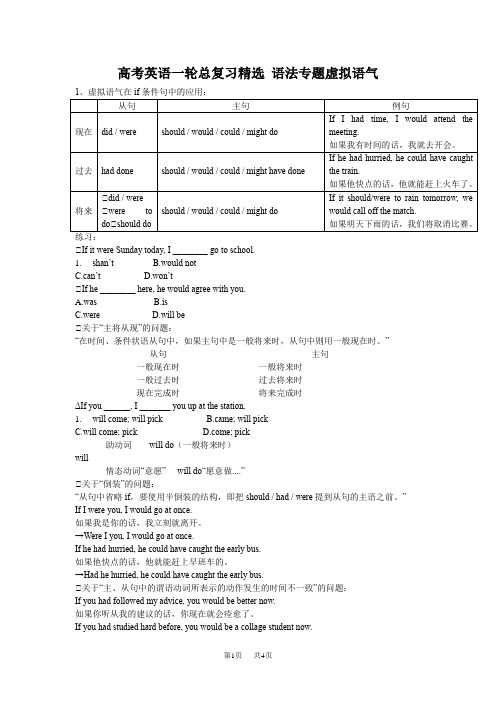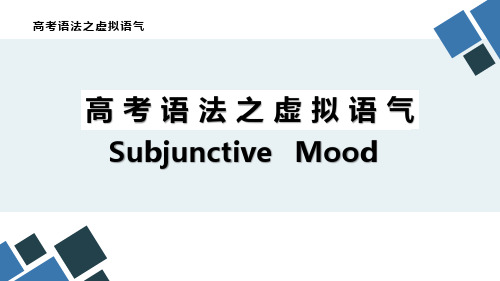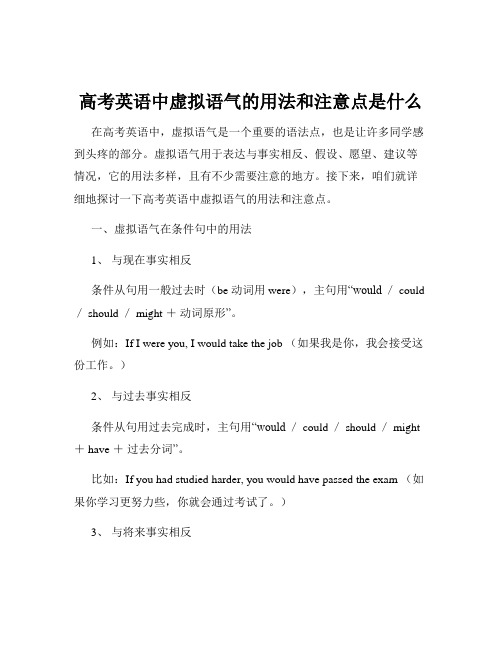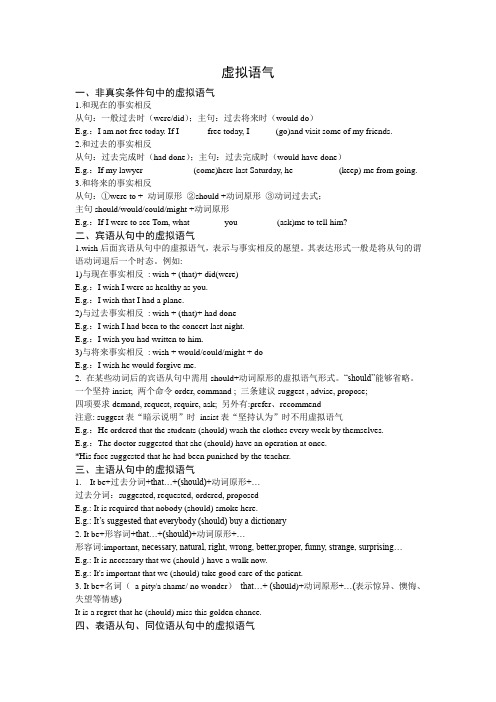高考英语虚拟语气语法专项讲解
高考英语语法专题虚拟语气详解

高考英语一轮总复习精选语法专题虚拟语气①If it were Sunday today, I ________ go to school.1.shan’t B.would notC.can’tD.won’t①If he ________ here, he would agree with you.A.wasB.isC.wereD.will be①关于“主将从现”的问题:“在时间、条件状语从句中,如果主句中是一般将来时,从句中则用一般现在时。
”从句主句一般现在时---------------------------一般将来时一般过去时---------------------------过去将来时现在完成时---------------------------将来完成时ΔIf you ______, I _______ you up at the station.1.will come; will pick B.came; will pickC.will come; picke; pick助动词------will do(一般将来时)will情态动词“意愿”----will do“愿意做....”①关于“倒装”的问题:“从句中省略if,要使用半倒装的结构,即把should / had / were提到从句的主语之前。
”If I were you, I would go at once.如果我是你的话,我立刻就离开。
→Were I you, I would go at once.If he had hurried, he could have caught the early bus.如果他快点的话,他就能赶上早班车的。
→Had he hurried, he could have caught the early bus.①关于“主、从句中的谓语动词所表示的动作发生的时间不一致”的问题:If you had followed my advice, you would be better now.如果你听从我的建议的话,你现在就会痊愈了。
高考英语复习语法知识专题讲解10---虚拟语气(解析版)

引导的让步和方式状语从 as if/though
He looks as if he were an artist.
句
He talked about the accident as if he had seen it.
in order that, so that, in case, for fear that
提前,即 故填 were/should/had
Were/Should/Had I..., Were
4. have fallen 解析:句意:要是没有政府和科学家的合作,与艾滋病相关的死亡人数就不会从 2005 年的 最高值降下来。从句“Had...not worked together”是对过去情况的假设,所以主句谓语要用 wouldn't have done.
necessary, natural, strange, important,
等 用 于 句 型 surprising, vital
“It
中, 引导的主语从 is+adj.+that...” that
句中谓语动词常用“(should)do”形式
It is necessary that he(should)sort out the information for my reference.
高考英语复习语法知识专题讲解 专题十 虚拟语气
一.虚拟语气在 if 非真实条件句中的应用
虚拟条件从句(if)
主句
与现在事实相反的 主语+did/were
假设
与过去事实相反的 主语+had done
假设
与将来事实相反的 主语+ 1.did/were
假设
2.should do
高考英语二轮专题语法系列--虚拟语气讲义

虚拟语气虚拟语气表示说话人的主观愿望、猜测、建议或与事实不符的假设等,也可以表示可能性较小的情况或不可能发生的情况,而不是客观存在的事实(表示客观事实要用陈述语气)。
虚拟语气是由句中谓语动词的特殊形式表现出来的。
虚拟语气常用于复合句中,也可用于简单句。
比较:If she asks me tomorrow,I shall do it.如果她明天请求我,我会做的。
(陈述语气,说话人认为请求的可能性大)If she asked me tomorrow, I should do it. 假如她明天请求我,我会做的。
(虚拟语气,说话人认为请求的可能性小或不可能请求)1 虚拟语气的用法1-1 虚拟语气用于条件状语从句中1)表示与现在事实相反的情况If I were/was not busy today, I should go with you.如果我今天有空,我会同你一起去的。
If he were/was here,he might talk with you.如果他在这里,他可能会同你谈谈。
If I were you,I wouldn't accept her suggestion.如果我是你,我不会接受她的建议。
If I knew the answer to the question,I should/ would tell you.如果我知道问题的答案,我当然会告诉你。
If we left now, we should/would arrive there in time.如果我们现在就动身,我们会准时到达那里。
If he didn't do exercise every day,he wouldn't be so strong.如果他不每天锻炼,他不会那样强壮的。
If it weren't raining, we would go fishing.要是现在不下雨,我们就去钓鱼了。
高中英语-虚拟语气精讲(超全整理篇)

• She made a request that the doctor(should)be sent for at once. • The teacher gives us a suggestion that we (should) practise reading English everyday.
• It’s suggested that the plan (should) be carried out at once . 主语从句
• The old woman’s demand is that her son (should) come to see her once a week. 表语从句
1) If he has time,he will go shopping tonight.
与事实相反!
2) If I had time,I would visit you.
与过去事实相反
虚拟条件句
had done
主句
should/would/might/co uld +have +done
If the staff had been more careful,
现在 过去
did / were had done 1. did / were 2. should do 3. were to do
将来
would/could/should/ might + V.(原)
与现在事实相反: 虚拟条件句
did be---were
主句
should/would/could/mig ht + do
二. 虚拟语气特殊句型与固定句式
(一) 两个常考虚拟语气句型
2025届高考英语虚拟语气知识点总结+课件

Homework
1. 完成高考汇编关于虚拟语气的练习题; 2. 用虚拟语气完成小诗。小诗的首句已给出。
If I were a bird, I would fly into the sky. ......
Thanks
为什么不用If I am a boy? 为什么不用If I was a boy?
虚拟语气是由句中的谓语动词的特殊形式表示出来的。
动词语气
1、虚拟语气:虚拟语气表示说话人的主观愿望、猜疑、建议或与事实不符 的假设等,而不表示客观存在的事实。 2、虚拟语气是由句中的谓语动词的特殊形式表示出来的。
你会辨认虚拟语气了吗?
对现在的虚拟条件从句
If there were no subjunctive(虚拟语气), English would be much easier.
从句
主句
If + 主语 + 过去式(were),主语 + should/would/could/might + 动词原形
来练一练
1. If there ____w__e_r_e____ (be) no air or water,there ____w_o_u__ld__b_e_____no living things on the earth.
如果我是个男孩 我想我能够明白 爱一个女孩是什么样的滋味 我发誓我会是一个好男人 我会倾听她, 因为我了解
When you loose the one you wanted 失去了你爱的人那有多痛苦
Cause he’s taken you for granted
因为他把你视作理所当然
And everything you had got destroyed! 你的一切都被毁
高考英语中虚拟语气的用法和注意点是什么

高考英语中虚拟语气的用法和注意点是什么在高考英语中,虚拟语气是一个重要的语法点,也是让许多同学感到头疼的部分。
虚拟语气用于表达与事实相反、假设、愿望、建议等情况,它的用法多样,且有不少需要注意的地方。
接下来,咱们就详细地探讨一下高考英语中虚拟语气的用法和注意点。
一、虚拟语气在条件句中的用法1、与现在事实相反条件从句用一般过去时(be 动词用 were),主句用“would / could / should / might +动词原形”。
例如:If I were you, I would take the job (如果我是你,我会接受这份工作。
)2、与过去事实相反条件从句用过去完成时,主句用“would / could / should / might + have +过去分词”。
比如:If you had studied harder, you would have passed the exam (如果你学习更努力些,你就会通过考试了。
)3、与将来事实相反条件从句有三种形式:① should +动词原形;② were to +动词原形;③一般过去时。
主句用“wou ld / could / should / might +动词原形”。
举个例子:If it should rain tomorrow, we would stay at home (要是明天下雨,我们就待在家里。
)二、虚拟语气在宾语从句中的用法1、 wish 后的宾语从句表示与现在事实相反,用一般过去时;表示与过去事实相反,用过去完成时;表示与将来事实相反,用“would / could +动词原形”。
例如:I wish I were as tall as you (我希望我和你一样高。
)2、表示“建议、要求、命令”等动词后的宾语从句这类动词有suggest(建议)、advise(建议)、insist(坚持要求)、order(命令)、demand(要求)等,从句谓语用“should +动词原形”,should 可以省略。
2023届高考英语语法:虚拟语气讲义

虚拟语气虚拟语气表示动作或状态与事实相反,或不可能发生的情况。
一、虚拟语气用于条件状语从句中从句主句与现实事实相反一般过去式(be--were)Should/would/could/might + V原与过去事实相反Had + done Should/would/could/might +have done与将来事实相反过去式;should+V 原;were to + V原Should/would/could/might + V原1. 表示与现在事实相反或不可能发生:条件状语从句:一般过去时(虚拟语气中be→were)主句用:would(should, could, might)+动词原形。
If we had time now, we would read it again.If I were you, I would work hard.2. 表示与过去事实相反或不可能发生:条件状语从句:had+过去分词;主句:would(should, could, might)+have+过去分词。
If he had taken my advice, he would have succeeded in the test.If I had known your telephone number then, I would have called you.3. 表示与将来的事实可能相反或不可能发生:条件状语从句:①一般过去时②should +动词原形③were to+动词原形;主句:would(should, could, might)+动词原形。
If it should rain, the crops would be saved.If it were to snow tomorrow, they would not go out.例句:If there were no subjunctive mood, English ( ) much easier to learn. (B)A. could have beenB. would beC. will beD. would have been(2)省略if的虚拟语气如果从句中含有were/ should/ had时,则可以把这三个词置于句首,省略if.采用倒装语序。
高考英语语法讲解——虚拟语气

虚拟语气一、非真实条件句中的虚拟语气1.和现在的事实相反从句:一般过去时(were/did);主句:过去将来时(would do)E.g.:I am not free today. If I ______free today, I _____ (go)and visit some of my friends.2.和过去的事实相反从句:过去完成时(had done);主句:过去完成时(would have done)E.g.:If my lawyer ___________(come)here last Saturday, he __________(keep) me from going.3.和将来的事实相反从句:①were to + 动词原形②should +动词原形③动词过去式;主句should/would/could/might +动词原形E.g.:If I were to see Tom, what _______ you ________ (ask)me to tell him?二、宾语从句中的虚拟语气1.wish后面宾语从句中的虚拟语气,表示与事实相反的愿望。
其表达形式一般是将从句的谓语动词退后一个时态。
例如:1)与现在事实相反: wish + (that)+ did(were)E.g.:I wish I were as healthy as you.E.g.:I wish that I had a plane.2)与过去事实相反: wish + (that)+ had doneE.g.:I wish I had been to the concert last night.E.g.:I wish you had written to him.3)与将来事实相反: wish + would/could/might + doE.g.:I wish he would forgive me.2. 在某些动词后的宾语从句中需用should+动词原形的虚拟语气形式。
- 1、下载文档前请自行甄别文档内容的完整性,平台不提供额外的编辑、内容补充、找答案等附加服务。
- 2、"仅部分预览"的文档,不可在线预览部分如存在完整性等问题,可反馈申请退款(可完整预览的文档不适用该条件!)。
- 3、如文档侵犯您的权益,请联系客服反馈,我们会尽快为您处理(人工客服工作时间:9:00-18:30)。
虚拟语气一、考点聚焦1、虚拟语气用于条件状语从句中(1)表示与现在事实相反的假设,条件状语从句中的谓语动词用“过去式(be动词的过去式用were)”,而主句中的谓语动词用“would / should/ could / might + 动词原形”。
如:If I were a boy, I would join the army.If the had time, she should go with you.(2)表示与过去的事实相反,条件状语从句中的谓语动词用过去完成时,主句中的谓语动词则用“would / should / might / could + have +过去分词”。
如:If he had taken my advice, he would have succeeded in the competition.(3)表示与将来事实相反,条件状语从句中的谓语动词一般过去时或should(were to) + 动词原形,而主句中的谓语动词则用would / should/could might + 动词原形。
如;If it were to rain tomorrow, the football match would be put off.(4)当条件状语从句表示的行为和主句表示的行为所发生的时间不一致时,动词的形式要根据它所表示的时间作相应调整。
如:If they had worked hard, they would be very tired.(从句说的是过去,主句指的是现在) 以下表格是虚拟语气用于条件状语从句中时,主句和从句谓语动词的形式:条件状语从句主句与过去事实相反had + 过去分词should /would/could/might + have + 过去分词与现在事实相反一般过去时(be用were) would/should/could/might + 动词原形与将来事实相反一般过去时或should(were to)+ 动词原形Would/should/cold/might + 动词原形有时候在使用时可省略if,句子则可换成下列形式,即“were / had / should +主语”。
如:Were I a boy, I would join the army.Had he taken my advice, he would have succeeded.Were it not for the expense, I would go to Britain.2、虚拟语气用于名词性从句(1)虚拟语气在宾语从句中的运用。
①“wish + 宾语从句”表示不能实现的愿望,译为“要是……就好了”等。
表示现在不能实现的愿望,从句中的谓语动词用一般过去时;表示将来不能实现的愿望,从句中的谓语动词用“would/could + 动词原形”;表示过去不能实现的愿望,从句中的谓语动词用“had + 过去分词”或“could(should) + have + 过去分词”。
如:I wish it were spring all the year round.I wish I had known the answer.I wish I could fly like a bird.②在表示建议、要求、命令等的动词suggest、advise、propose、demand、require、insist request、command、order等后的宾语从句中,谓语动词用should + 动词原形或是动词原形。
如:She suggested we (should)leave here at once.The doctor ordered she should be operated.(2)虚拟语气在同位语从句和表语从句中的运用。
作表示建议、要求、命令等的名词advise、idea、order、demand、plan、proposal、suggestion、request等的表语从句和同位语从句,从句中的谓语动词用“(should)+ 动词原形”。
如:His suggestion that we (should)go to Shanghai is wonderful.My idea is that they (should)pay 100 dollars.(3)虚拟语气在主语从句中的运用。
在主语从句中,谓语动词的虚拟语气用“should + 动词原形”的结构,表示惊奇、不相信、理应如此等。
如:It is necessary(important, natural, strange, etc.)that we should clean the room every day.It was a pity (a shame, no wonder, etc.)that you should be so careless.It will be desired(suggested, decided, ordered, requested, proposed, etc.)that she should finish her homework this afternoon.注意:这种从句表示的是事实。
如果说人对这种事实表现出惊奇的情感,就可用虚拟语气。
反之,如果不表示惊奇等情感,that从句也可用陈述句语气。
如:I t is pity that you can’t swim.3、虚拟语气在其他场合的运用(1)虚拟语气在as if/as though、even if/even though等引导的表语从句或状语从句中,如果从句表示的动作发生在过去,用过去完成时;指现在状况,则用一般过去时;指将来状况则用过去将来时。
如:He did it as if he were an expert.Even if she were here, she could not solve the problem.(2)虚拟语气用于定语从句中。
这种从句常用于句型“It is (high)time (that) … ”中,定语从句的谓语动词用一般过去时(be用were)或should + 动词原形,意思是“(现在)该……”。
如:It’s time that I picked up my daughter.It’s high time we were going.(3)虚拟语气用在if only引导的感叹句中。
如:If only I were a bird.If only I had taken his advice.(4)虚拟语气在一些简单句中的运用。
①情态动词的过去式用于现在时态时,表示说话人谦虚、客气、有礼貌或语气委婉,常出现在日常会话中。
如:It would be better for you not to stay up too late.Would you be kind enough to close the door?②用于一些习惯表达法中。
如:Would you like a cup of tea?I would rather not tell you.二、精典名题导解选择填空1. When a pencil is partly in a glass of water, it looks as if it _______. (NMET 95)A.breaksB.has brokenC.were brokenD.had been broken解析:答案为C。
本题考查的是as if 引导的让步状语从句中的语气问题,as if引导的状语从句如果与事实一致,不用虚拟语气,如果与事实相反,应用虚拟语气。
题中“当铅笔的一部分浸在水中,铅笔看上去好像断了”。
而实际上铅笔并未断,与事实相反,前半部分陈述是一般现在时,因而本句是对一般现在时的虚拟,用were broken。
2. I didn’t see your sister at the meeting. If she ___________, she would have met my brother.(NMET 94)A.has comeB.did comeC.cameD.had come解析:答案为D。
本题考查的是if条件句中的虚拟语气。
题意是:我在会议上没看到你姐姐,故你姐姐没来。
因此如果“她来了”与事实相反,前面一句交代了虚拟语气的时态是一般过去时的虚拟,所以if从句中用had+过去分词。
3. —If he ___________, he ________that food.—Luckily he was sent to the hospital immediately.(NMET 93)A.was warned; would not takeB.had been warned; would not have takenC.would be warned; had not takenD.would have been warned; had not taken解析:答案为B。
本题考查的是条件状语从句与主句表示与事实相反时虚拟语气的用法。
根据下一句语境可知,他事先并没有得到警告,表示过去时间的虚拟语气,故选B。
4.Mr.White at 8:30 for the meeting, but he didn’t show up.A. should have arrivedB. should arriveC. should have had arrivedD. should be arriving解析:答案为A。
本题考虚拟语气及责备的用法,全句意为:Mr.white 8:30(原本)应该到会的,但他没露面。
全句谈的是过去的事,故应使用should have done结构,表原本该做而没做的事。
5.—I’ll tell Mary about her new job tomorrow.—You her last week.A. ought to tellB. would have toldC. must tellD. should have told解析:答案为D。
本题考查情态动词用法,should(ought to)have done表示说话人对发生的事性“责备”故选D。
6.—Let’s go and have a good drink tonight.—Have you got the first prize in the competition?A. What for?B. Thanks a lot.C. Yes, I’d like to.D. Why not?解析:答案为A。
